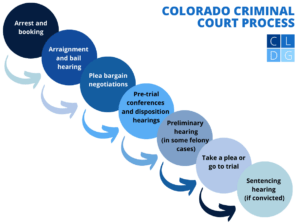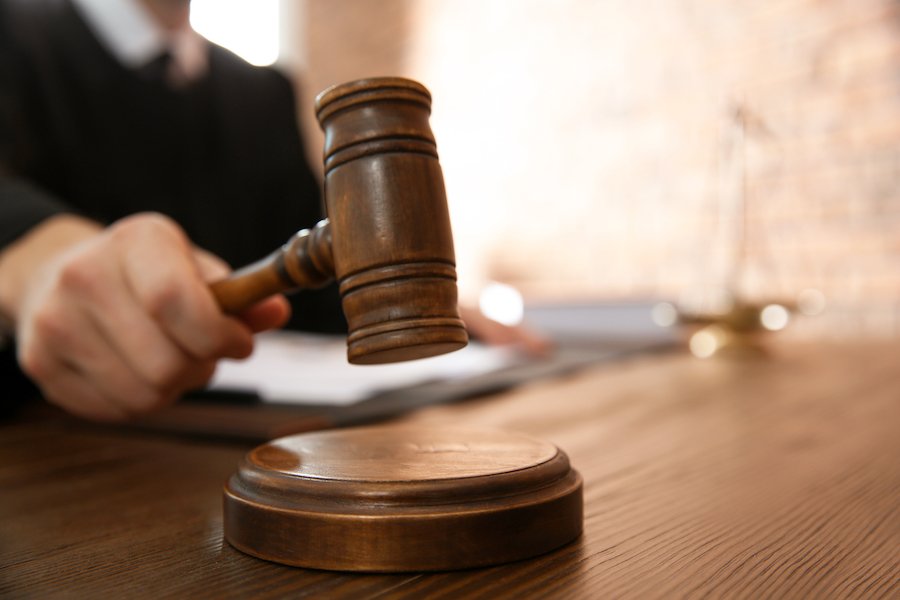The criminal court process in Colorado usually begins with an arrest, followed by booking, bail, an indictment, advisement, arraignment, preliminary hearing in district court, pretrial conference, motions, disposition hearing, jury trial, and sentencing.
After trial, a criminal case can be subject to post-trial motions or appeals. With a plea bargain, the criminal court process can be over in a matter of weeks. However, taking a case all the way through trial and appeals can take months or even years.

In this article, our Denver Colorado criminal defense lawyers will address:
- 1. What Happens After an Arrest in Colorado?
- 2. Will I Get Out on Bail or Bond?
- 3. What Will Happen at My Arraignment?
- 4. What is a Pretrial Conference?
- 5. Should I Accept a Plea Deal?
- 6. Will My Case Go To a Jury Trial?
- 7. What Happens After Trial?
1. What Happens After an Arrest in Colorado?
In order to place someone under arrest, police officers must have probable cause to believe that someone committed a crime. This includes a law enforcement officer witnessing something they believe constitutes criminal activity, or as the result of an investigation where a judge issues an arrest warrant. Just because the police officer or judge believes that there is probable cause to arrest someone does not mean that an individual is guilty. That decision is left to the criminal court process.
During an arrest, the police will generally take the person into custody, which may involve being searched, patted down, handcuffed, and put in the back of a police car. Depending on the suspected criminal offense, the suspect may or may not be read their Miranda rights. Many people believe the police have to read them Miranda warnings during an arrest. However, the warning is only required for police questioning or interrogations.
After an arrest, you may be taken to jail and booked on criminal charges. This may involve taking your name and information, taking and cataloging personal property, a full body search, taking fingerprints, and a photo, or “mug shot.” Booking records are generally available to the public, and in some cases, newspapers or websites may even post information about individuals who were arrested, even if they have not been found guilty.1
2. Will I Get Out on Bail or Bond?
After the suspect has been booked, they may be able to get released on bail. This allows them to return to the community while waiting for their initial court hearing. If the suspect is considered a flight risk, they may be held in custody pending a hearing to decide whether they can be released on bail and how much the bail may be. Factors that affect the amount of bail and whether a suspect is a flight risk include:
- Ties to the community
- The previous record of not appearing for court
- Financial resources
- Employment status
- The severity of the crime and length of the possible sentence
- Safety risks
People use the terms bond and bail interchangeably but they are different in the criminal justice system. Bail refers to the amount of money a suspect has to put up to the court before they can be released. This money acts as a sort of guarantee that they will show up for their court date. If they skip their court appearance or flee, the state may be able to confiscate the bail, which is often a significant amount of money.
Most people have a hard time coming up with a large sum of cash on short notice. Instead, they go to a bail bonds company. A bail bond company puts up some of the money to the court and guarantees the full amount will be paid if the suspect flees. In exchange, the bond company takes a percentage of the bail amount as a fee from the family (usually about 10-15% of the bail amount in Colorado). The bond company also secures the loan with collateral, such as a car or home.2

Most defendants enter an initial not guilty plea at the arraignment.
3. What Will Happen at My Arraignment?
After an arrest, the suspect will appear in court for advisement and arraignment. For many defendants, this is the defendant’s initial appearance. If the defendant cannot afford an attorney, the judge will assign him/her a public defender.
During the advisement, they are informed of the criminal charges against them, including the potential criminal penalties involved. During the arraignment, the prosecution presents the criminal complaint against the defendant, including a list of all the criminal offenses.
The prosecutor may present an offer to the defendant with a proposed sentence. This may be the first chance for the suspect to respond to the charges as “guilty” or “not guilty.” If they accept the deal and plead guilty, the judge will impose a sentence. The sentence may or may not be the same as what the prosecutor proposed.
If the defendant pleads not guilty, the case will proceed to the pretrial phase, and the judge will set the date for the next court appearance.
Note that defendants who fail to appear at their arraignment…or have private counsel appear for them…will have a bench warrant issued for their arrest.
4. What is a Pretrial Conference?
After the arraignment, your attorney will have access to the records available in your case, including police reports, documents, and evidence. This evidence will help your attorney evaluate the strength of the state’s case against you, and identify weaknesses in the case. Your Colorado criminal defense attorney and the state prosecutor, or district attorney, may discuss a possible plea bargain during a pretrial hearing. A plea bargain is a deal struck between the defendant and the D.A. This may involve dropping some criminal charges in exchange for pleading guilty to lesser charges. If the defense attorney can show the prosecutor that they do not have sufficient evidence to sustain a conviction, the charge could be dismissed.
5. Should I Accept a Plea Deal?
Whether or not you should accept a plea agreement is ultimately up to you. Your attorney can negotiate and advise you on whether they think you should or should not take the deal, but you have the final decision. There may be a number of factors in determining whether entering a plea of guilty or no contest is right for you. A plea bargain may be a good option if the state has substantial evidence against you, where you can accept a lighter sentence and avoid the maximum jail time. A plea bargain may also be to your benefit if the D.A. agrees to reduce a felony charge down to a misdemeanor. Felony convictions have harsher penalties and much more restrictions that follow you after serving time.
If you have a strong case, the D.A. may just want to get you to plead guilty to a lesser charge so they get a conviction, even if it is a conviction for a minor charge. The D.A. may know they do not have a good case against you, even if they are putting on a front that they do. Even after you do not accept a deal, the D.A. may later drop the case because of lack of evidence, or they do not have the time and resources to commit to a weak case.
After the preliminary hearing and pretrial conferences, your Colorado criminal defense attorney will better understand your case’s strengths and weaknesses. Talk to them about the potential benefits and drawbacks of a plea deal in your case.

Most criminal cases resolve through a plea deal, not a trial.
6. Will My Case Go To a Jury Trial?
Most criminal cases never make it to trial. The majority are handled through plea deals, where the defendant can get a reduced sentence and the D.A. still gets a conviction. A criminal trial is held before a judge, known as a bench trial, or a jury. In a jury trial, your case will be held before a judge to determine matters of law, and the jury of your peers is to make factual determinations. The trial process can last a couple of days or months, depending on the type of case.
The trial usually begins with pretrial motions, where the D.A. or defense attorney may try and file motions relevant to the case, such as motions to suppress evidence. After pretrial motions, the parties move on to jury selection. A pool of potential jurors is interviewed, with each attorney having the option to dismiss jurors for cause or with a limited number of peremptory challenges.
After jury selection, the case begins with the D.A. making an opening statement and presenting the case against the defendant, and the defense attorney responding. After submitting evidence to the jury, calling witnesses, experts, arguing for or against a conviction, and making closing arguments, the jury makes a determination if there is enough evidence to find guilt beyond a reasonable doubt for each of the criminal charges. If the defendant is found guilty of any charges, the case may move on to sentencing.3
7. What Happens After Trial?
After the trial is over, a sentencing hearing is set to determine the penalties. The sentence can be based on mandatory minimum penalties, recommended sentences, the defendant’s criminal record, and mitigating or aggravating factors.
If the defendant is found not guilty, the D.A. may be able to file an appeal based on perceived errors that occurred during the trial. Alternatively, if the defendant is found guilty, the defendant may decide to file an appeal.
Legal References
- CRS 16-7-201 et seq.
- CRS 16-4-101 et seq; see also People v. Neuhaus, (2012) CO 65, 289 P.3d 19; see also People v. Adargo, (Colo. App. 1980) 622 P.2d 593.
- CRS 16-7-101 et seq.
